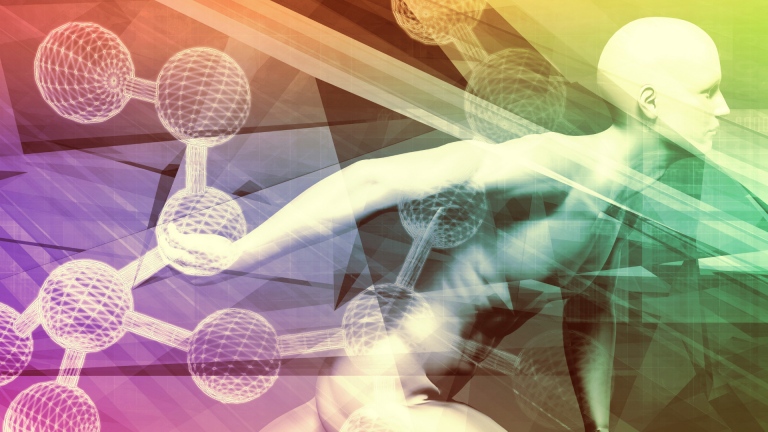PROTEIN AND WHAT HAPPENS TO THE BODY?
When you eat a portion of food with protein in it (and almost all foods contain some amount of protein – even salad!), your body breaks down the protein into its amino acids. These amino acids travel through the body. The amino acids are recombined to create new proteins (remember, there are 10,000+ different types of protein in your body!).
So, some of the veggie burgers you eat turn into muscle proteins, hair proteins, hormone proteins, and so on.
If a cell doesn’t have the code for a specific protein, the protein doesn’t get made. Some specialized cells produce particular kinds of protein that other cells don’t, even though all the cells in a body carry the same DNA. Some genes, or sequences of DNA information that code for the production of a protein are expressed more or less depending on what kind of cell it is. Hair follicle cells produce keratin protein abundantly, while other cells in the same body produce none. In a man, testicle cells not only have sperm cells, but those same cells create a chemical signal to the other cells in the body. That chemical signal that gets released into the blood by the testicle cells is called Testosterone.
Eating Wisely for Maximum Health
Diet is one of the top culprits for feeling passive and low energy. Your energy levels have been inactive for quite some time now, or you’re looking for that extra kick-start to make you feel better. Proper meal planning plus a well-structured Vitamin Plan will maximize your body’s energy output. Here are seven ways in which you can kick-start your energy levels:
Choose your food wisely.
- Set yourself up for success by choosing your meals in advance. Planning is your best bet for eating healthy. Try pairing a protein with a carbohydrate to maintain energy throughout the day. Try my favorite mid-morning snack: blueberries and cottage cheese.
Eat small frequent meals.
- Try eating six small meals a day. Maintaining your blood glucose levels throughout the day will help sustain energy levels and thus avoid dips, which can lead to fatigue. Finding time to eat six small, healthy meals daily can be difficult. Try a protein shake. They are super simple to make! Add 1/3 cup of Whey Protein Powder, one banana, ½ cup of orange juice, and 1 cup of plain or fruit yogurt. This is a great way to supplement a meal and is the right balance of protein and carbohydrates.
Eat a good breakfast.
- Eating breakfast helps jumpstart your engines and increase your ability to concentrate and keep on track for the day ahead. Sticking with a good protein source and a complex carbohydrate, such as foods with high fiber content, will help slow digestion down, helping maintain your energy. Try one whole egg, two egg whites, one piece of whole-wheat toast, and 1 cup of orange juice.
Avoid simple sugars.
- Simple sugars like those found in candy, soda, cookies, and even some so-called “energy bars” can spike glucose (sugar) levels in the blood and move too much into your cells, which results in a crash. When your glucose levels come down too quickly, the feeling of fatigue and low energy can kick in. You may crave a quick sugar fix again a few hours later.
Go Low Fat.
- Eating a high-fat meal may make you feel sluggish and sleepy. Try a low-fat meal, especially during lunch, to keep you going throughout the day.
Keep yourself well hydrated.
- Once you find yourself thirsty, you are already dehydrated. Dehydration can lead to fatigue and low energy levels. Make sure you drink at least 8-10 glasses of water each day to maintain hydration, more if you are exercising.
Moderation is Key.
- Remember not to do anything too extreme when you alter your diet for the long haul. A reduction is essential. Don’t try to eliminate all the foods that you love and crave. Eliminate them slowly.
Individuals often find that the more committed they are to a nutrition and exercise program, the less likely they are to desire or even want to eat unhealthy foods. A healthy diet will help you boost energy levels and is critical to a successful weight loss plan. Pairing good nutrition habits with an exercise program will lead you to success.
**NOTE** The content in this blog is subject to interpretation and is the opinion of the content writer. We do not claim it to be fact. We encourage you to consult a medical doctor before taking any prescribed medications or supplements.
Conclusion
Supporting Hormones health is essential for overall well-being and vitality. By incorporating regular exercise, proper nutrition, adequate sleep, stress management techniques, and IV therapy, you can help maintain optimal testosterone levels and lead a healthy, balanced life. Always consult a healthcare professional before making significant changes to your lifestyle or starting any new treatments to ensure they suit your needs.
At AAI Rejuvenation Clinic, we advise anyone to think seriously about beginning Hormone treatment if there is no medical need for it. However, we will take every precaution to ensure that you read your program’s positive benefits by providing the latest at-home hormonal mouth-swab testing to ensure we are continually monitoring your progress and aware of any adverse side effects. Fill out the Medical History Form, or if you need more information, call us at (866) 224-5698 or (866) AAI-Low-T.
Low Hormone Symptoms
- Motivation
- Sex Drive and Desire
- Depression
- Fatigue
- Erectile Dysfunction
- Cholesterol
- Low Energy
- Memory Loss
- Osteoporosis
- Wounds & Illness
- Muscle Mass
- Sleep Disturbances
- Thyroid Dysfunction
- Weight Gain
]]>



